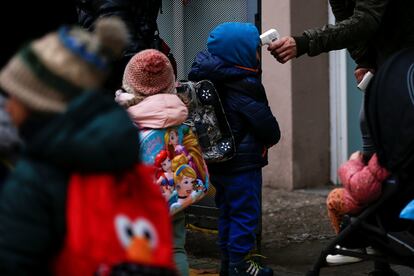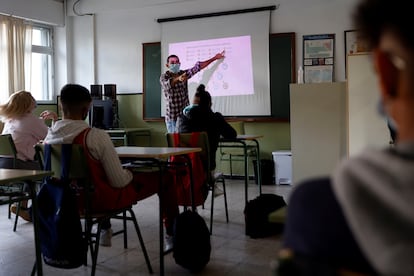Infected individuals in schools only pass coronavirus on to an average of 0.4 people, Catalan government finds
Just 1.4% of classrooms across the country are currently confined despite a nationwide surge in infections in Spain following the Christmas holidays

In Spain, schools are resisting the coronavirus. Education Minister Isabel Celaá said on Wednesday that just 1.4% of classrooms are currently confined despite a nationwide surge in infections following increased socializing during the Christmas holidays.
Spanish schools were closed during the first wave of the pandemic last year, and reopened in September with safety measures in place such as the creation of bubble groups and mandatory facemasks depending on the age of students.
The Catalan regional government, which has carried out more than a million PCR tests since the beginning of the academic year on students and workers at elementary and secondary schools, estimates that one infected individual only passes on the virus to an average of 0.4 people within the school setting.
After four months of classes, we haven’t had situations such as those in meatpacking plants, gyms and other places where adults gatherQuique Bassat, Barcelona Global Health Institute
Catalonia has the second-largest school population in Spain, with 1.38 million students (not counting universities or special education centers). It is the only region to use the bubble system at all levels of schooling, from early education to secondary school and vocational training.
In a bubble system, when a positive case is detected, the entire classroom is quarantined and its members get PCR tests. Catalonia has conducted the most comprehensive analyses to date on the impact of the pandemic on schools.
The results of the latest analysis, released by the Catalan departments of education and health, show that in 80% of cases, the infected individual, whether a student or a worker, did not pass the virus on to anyone else in the school building. And when they did, the average contagion was 1.8 cases. Each infected individual passed on the virus to an average of 0.42 people in the first three months of the academic year, and to 0.37 so far during the second three-month period.
These results coincide with the conclusions of a macro-study on infection rates in Catalan schools that has not yet been published, and whose authors include the epidemiologist and pediatrician Quique Bassat of the Barcelona Global Health Institute.
“This indicates that there is low transmissibility. With adults, without any precautions, what we call the secondary attack rate [the number of new cases among contacts divided by the total number of contacts] is somewhere between two and three. With precautions such as facemasks for everyone, that rate probably goes down to 1.5 or so. The fact that it is 0.4 at schools is very good news, and also reflects the efforts being made there to prevent transmission,” said Bassat. “It’s not just that children are inherently less infectious, it’s both things.”
Teenagers

The Catalan government’s figures are not broken down by age, but Bassat said that their own study showed significantly lower infection among the youngest students. This, he said, is not surprising. “Teenagers are more like adults, in terms of their habits and their physical characteristics, so it makes sense that they infect others in a similar way.”
The epidemiologist warns that with the teenager figures, there could be an impact from the fact that classes are only partly in-person, meaning that students do not spend as much time in school.
But the low transmissibility figure explains why there are few outbreaks at school, and why those that take place are not very big, said Bassat. “There are no examples of one case ballooning into 18; instead, it’s either none or one or two at the most. After four months of classes, we haven’t had situations such as those in meatpacking plants, gyms and other places where adults gather.”
The Catalan government’s information also underscores the correlation between a rise of cases in schools and community incidence: schools apparently do not amplify the epidemic, but they do reflect what is going on around them. “When we came back from the Christmas holidays, the first days were terrible because there were a lot of groups that had to be confined, but that was one of the peaks of incidence, and the situation since then has not gone up but down instead,” said Bassat.
The B.1.1.7 factor
“The only thing that could make things change is the British variant,” said Bassat. “It seems clear by now that it’s more infectious. The question is whether this rise will also affect children and turn them into something like adults with the traditional variant.”
Some figures from the United Kingdom suggest that this could be the case, but since the country has closed its schools, there is not enough information to go on, said this expert. “Closing schools is a precautionary measure, for sure, but you have to balance it out with children’s rights to a face-to-face education. And as long as we can’t prove that we are exposing them to a greater danger than we are aware of to date, or that they cause an increase in community transmission, I think we should remain firm about keeping schools open.”
English version by Susana Urra.
Tu suscripción se está usando en otro dispositivo
¿Quieres añadir otro usuario a tu suscripción?
Si continúas leyendo en este dispositivo, no se podrá leer en el otro.
FlechaTu suscripción se está usando en otro dispositivo y solo puedes acceder a EL PAÍS desde un dispositivo a la vez.
Si quieres compartir tu cuenta, cambia tu suscripción a la modalidad Premium, así podrás añadir otro usuario. Cada uno accederá con su propia cuenta de email, lo que os permitirá personalizar vuestra experiencia en EL PAÍS.
¿Tienes una suscripción de empresa? Accede aquí para contratar más cuentas.
En el caso de no saber quién está usando tu cuenta, te recomendamos cambiar tu contraseña aquí.
Si decides continuar compartiendo tu cuenta, este mensaje se mostrará en tu dispositivo y en el de la otra persona que está usando tu cuenta de forma indefinida, afectando a tu experiencia de lectura. Puedes consultar aquí los términos y condiciones de la suscripción digital.









































